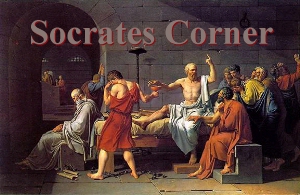Supreme Court in the Age of Trump: An Examination of Justices Gorsuch and Kavanaugh
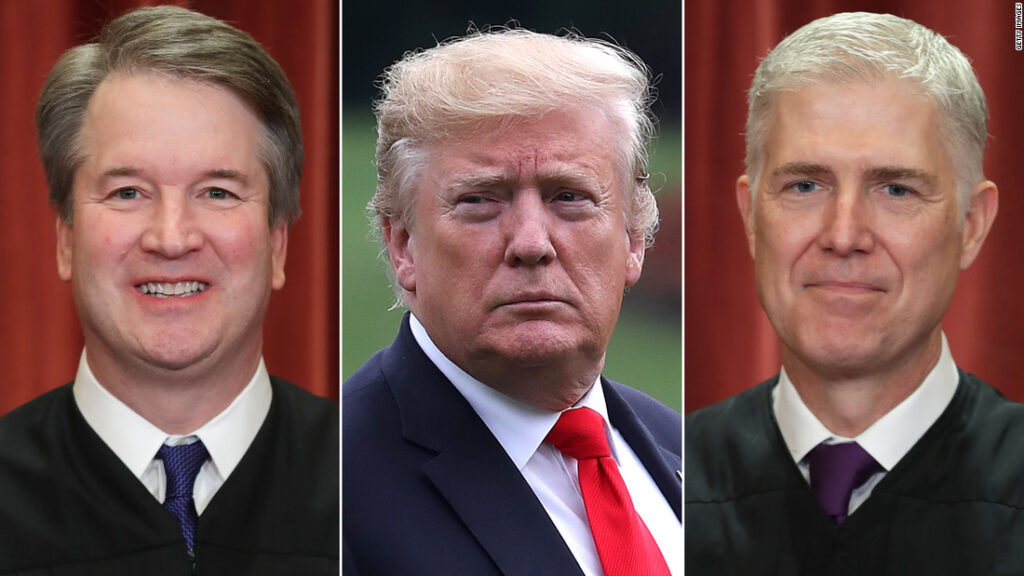
“Throughout my decade on the bench, I have watched my colleagues strive day in and day out to do just as Socrates said we should – to hear courteously, answer wisely, consider soberly, and decide impartially.”
~ Neil Gorsuch, Associate Justice of the Supreme Court
“The Supreme Court is the last line of defense for the separation of powers and for the rights and liberties guaranteed by the Constitution.”
~ Brett Kavanaugh, Associate Justice of the Supreme Court
“Courts have a vital responsibility to enforce the rule of law, which is critical to a free society. But courts are not designed to solve every problem or right every wrong in our public life. The policy decisions and value judgments of government must be made by the political branches elected by and accountable to the People. The public should not expect courts to do so, and courts should not try.”
~ Judge Amy Coney Barrett, Opening State to the Senate Judiciary Committee
Supreme Court Nominee 2020
The nomination of a Supreme Court Justice to the U.S. Supreme Court is a rare honor that is largely viewed as the single greatest contribution to the legacy of an American Presidency because if the Justice is young enough they can reflect the nominating president’s policies for a quarter century or more, long after his term as president has ended. The Chief Justice and every one of the 8 Associate Justices can serve on the court for as long as they live, unless they are removed from office for ‘high crimes or misdemeanors’ or decide to retire. It is because of this life-time tenure that some Presidents are not even afforded the opportunity to nominate a Justice even within the 4-8 years of their time in office. The Supreme Court is the highest court in the land and thus heads the federal Judiciary and wields appellate jurisdiction to review, amend and even overrule all federal and state cases containing an aspect of federal law. Within cases that fall under the Court’s jurisdiction, it can even employ judicial review to strike down executive orders or legislative statues that are deemed to be in violation of a Constitutional provision.
Under the Trump Administration, there have been two extremely qualified nominees that have ascended to the Supreme Court, Neil Gorsuch in April 2017 and Brett Kavanaugh in October 2018. But as of Saturday September 26th, President Trump made the historic declaration to nominate Judge Amy Coney Barrett to fill the vacancy left by the late Justice Ruth Bader Ginsburg. Barrett currently serves on the U.S. Court of Appeals for the Seventh Circuit, having been appointed in May 2017 by President Trump, and prior to this was employed as a Law Professor at her alma mater, the University of Notre Dame. Following her time in law school, Barrett clerked for Judge Laurence Silberman of the U.S. Court of Appeals for the D.C. Circuit from 1997-1998 and notably clerked for Justice Antonin Scalia of the U.S. Supreme Court from 1998-1999. Just prior to President Trump’s nomination of Barrett to the Supreme Court in the Rose garden, Barrett had been on a short list of potential Supreme Court nominees, more recently in the fall of 2018 as one of the three finalists alongside Brett Kavanaugh (who would actually be appointed that year) and Raymond Kethledge.
Amid a major election year, with less than one month before election day, Barrett’s nomination to the Supreme Court to fill Ginsburg’s vacancy sparked a whirlwind of controversy and attention, mostly from dissenters in the Democrat Party. Such a nomination sheds light upon President Trump’s first-term judicial legacy, as Trump recently mentioned during his powerful first debate performance against Democrat Presidential nominee Joe Biden that he will have nominated approximately 300 federal judges by the end of his first-term in office. Highlighting the significance of this milestone achieved with the approval of the Republican controlled Senate, and ironically through the indirect inaction by President Obama leaving a great deal of vacancies on the federal bench, President Trump declares,
“Some people say maybe the most important by the end of the first term, I’ll have approximately 300 Federal judges and Court of Appeals judges, 300 and hopefully three great Supreme Court judges, justices. That is a record the likes of which very few people [have seen] and one of the reasons I’ll have so many judges is because President Obama and him [gestures to Biden] left me 128 judges to fill.”
With the Supreme Court in the national spotlight at this time, it is important to evaluate the performance of President Trump’s prior two nominees, Neil Gorsuch and Brett Kavanaugh, shedding light upon how they have distinguished themselves in the court during Trump’s first-term. Providing an in-depth examination of major cases these two have presided over thus far in the past 3 years will give great perspective upon the direction of the Supreme Court in the age of Trump and on the horizon of another soon to be approved Trump-appointed Justice. Gorsuch and Kavanaugh, having been hardline conservatives prior to their ascendency to the court, have for the most part maintained an unwavering fidelity to the original intent of the Constitution and a judicial interpretation that follows a strictly Textualist approach, adhering to what was specifically written by the Framers. Such exemplary jurisprudence should inspire Judge Barrett to follow suit and expectedly establish herself in a similar light, faithfully interpreting and upholding the rule of law with no ties to legislative intent or legal positivism as exemplified in. Barrett’s quote from her opening statement above.
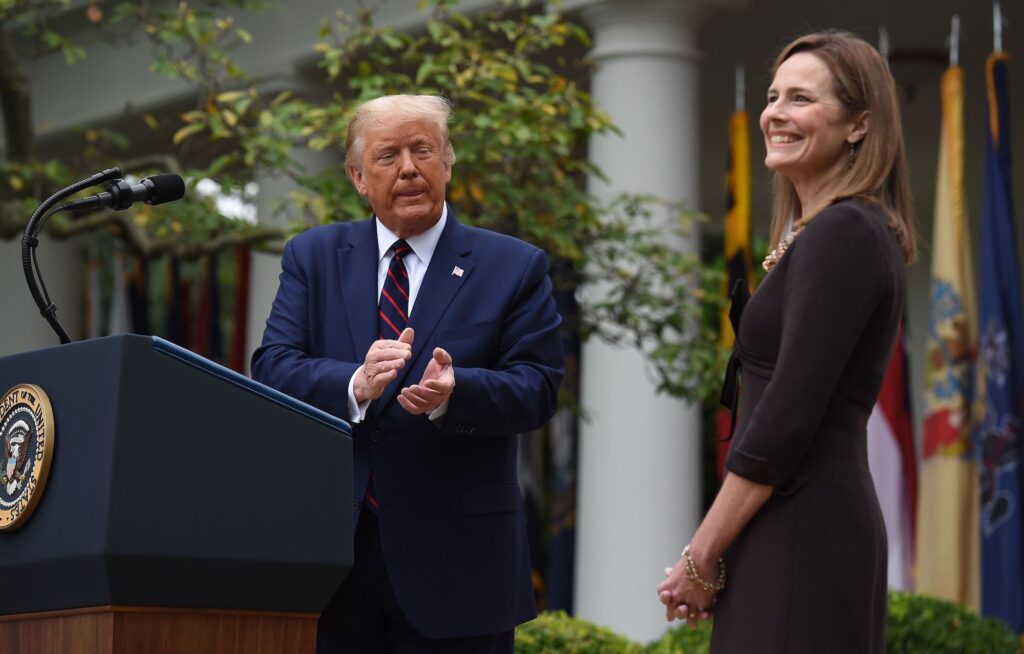
Leading by Example: Justices Gorsuch and Kavanaugh Start off Strong
Beginning with Justice Neil Gorsuch, he has mostly maintained a strict Textualist interpretation of the Constitution in many of the cases presented before him. In one of the earliest cases he has faced, Paven v. Smith, Gorsuch dissented from the Court majority striking down an Arkansas law that treated gay couples as different from heterosexual married couples on their children’s birth certificate. “It is very hard to see what is wrong with this conclusion for, just as the state court recognized, nothing in Obergefell indicates that a birth registration regime based on biology, one no doubt with many analogues across the country and throughout history, offends the Constitution,” Gorsuch argued in his dissent. Gorsuch has distinguished himself as an outspoken and staunch defender of the Constitution and its original meaning, even going so far as to provide a detailed lecture to his colleagues on the court in an oral argument made in Gill v. Whitford regarding the unconstitutionality of Justices having the power to influence gerrymandering:
“And where exactly do we get authority to revise state legislative lines? When the Constitution authorizes the federal government to step in on state legislative matters, it’s pretty clear—if you look at the Fifteenth Amendment, you look at the Nineteenth Amendment, the Twenty-sixth Amendment, and even the Fourteenth Amendment, Section 2, says Congress has the power, when state legislators don’t provide the right to vote equally, to dilute congressional representation. Aren’t those all textual indications in the Constitution itself that maybe we ought to be cautious about stepping in here?”
Gorsuch has preserved the traditional meaning of marriage between a man and a woman, and defended the natural right for the owner of a bakery to sell to whomever he chooses in the case of Masterpiece Cake Shop, Ltd. v. Colorado Civil Rights Commission (2018) . To his credit, even left-leaning Justices Breyer and Kagan sided with the more conservative wing of the bench in this 7-2 decision, arguing that religious and philosophical objections to same-sex marriage (held by the owner of Masterpiece Cake Shop) are protected views and can also be protected forms of expression. Later that same month of June 2018, Gorsuch joined with the conservative majority of the court in Husted v. A. Philip Randolph Institute, granting Ohio permission to target and remove infrequent voters from the voter rolls and prevent any further abuse of the right to vote. Gorsuch also upheld President Trump’s ban on Muslim countries deemed potentially dangerous due to their ties to Islamic terrorism, while also permitting the President’s ban on transgender people from serving in the United States military.
Gorsuch has often sided with my intellectual mentor and favorite Supreme Court Justice, Clarence Thomas, on key cases of interest, including in February 2019 where they urged the Court to reconsider Gideon v. Wainwright, a 1963 criminal justice centered case that guarantees criminal defendants a lawyer even if they can’t afford it. In addition to this opinion, Gorsuch was the only one to side with Thomas, dissenting in a case that reversed the conviction of Curtis Flowers on the premise that prosecutors unfairly excluded Blacks from the jury; Justice Thomas being the only Black on the Court obviously viewed race as a non-important indicator of jury selection and felt that it had no power or sway over Flowers’ conviction. Gorsuch also joined Kavanaugh in deciding that the government had the power to detain immigrants awaiting deportation indefinitely (even for years), after they are released from criminal custody, without a bail hearing (proponents of catch-and-release policy). In line with overruling and reconsideration of certain cases, Gorsuch and Kavanaugh comprised a 5-4 majority of the Court opinion, ruling that states cannot be sued in courts of other states without their consent. This utilized the Supreme Court’s original jurisdiction in cases between states, and in doing so, overturned a 40-year-old controversial precedent.
Gorsuch has voiced his dissent against extensions of Congressional authority delegated to administrative agencies or private organizations by reviving the non-delegation doctrine, unseen as a tool that checks extra-constitutionality since the New Deal era. Gorsuch is noted for often siding against the “moderate conservative” and defect swing-vote Chief Justice Roberts in cases, such as when he dissented with Kavanaugh from an opinion by Roberts, in a 5-4 ruling that the Trump Administration’s attempt to revoke the Deferred Action for Childhood Arrivals (DACA) program–an Obama administration mandate widely viewed as unconstitutional–was deemed arbitrary and capricious under the Administrative Procedure Act. Obama’s act unconstitutionally maintains roughly 700,000 illegal immigrants as American citizens based on the fact that they brought into this country as children upon their parents crossing the southern border illegally. In a recent case over the summer, Gorsuch and Kavanaugh have taken action against agency autonomy, raising issue with the wanton act of defiance and structurally unconstitutional Consumer Financial Protection Bureau (CFPB), allowing President Trump to fire the agency’s director with or without cause, following a majority ruling.
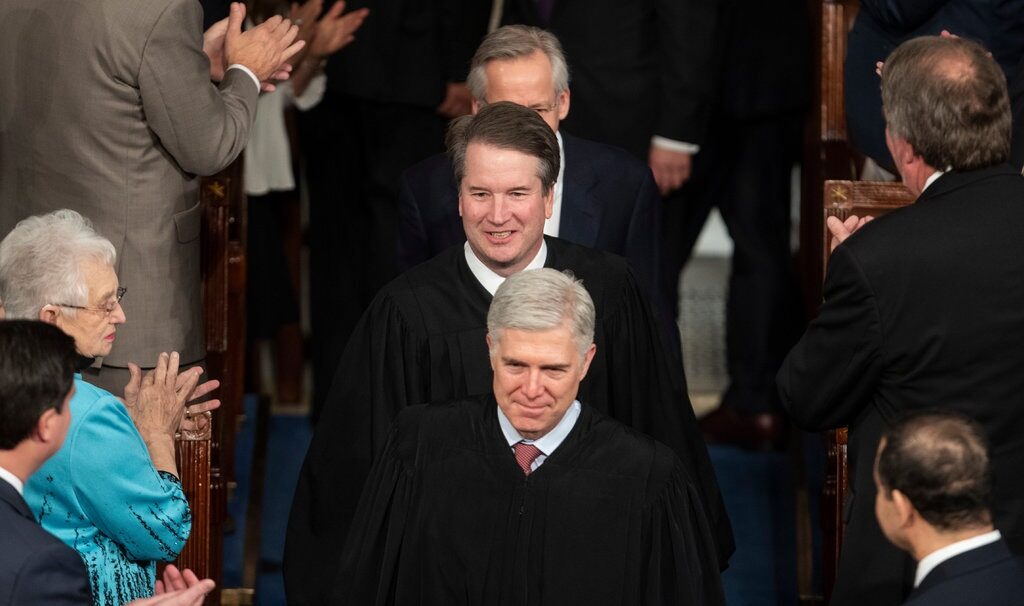
In step with many of Gorsuch’s rulings, Kavanaugh has taken a strictly Textualist and broadly originalist approach to the bench. According to Professor Johnathan Turley, Kavanaugh bears the most robustly supportive views of broad Presidential powers and immunities out of any of the federal judges considered by President Trump. By multiple judicial analyses, Kavanaugh is considered to be the most conservative justice on the bench behind only Justice Thomas. Kavanaugh has taken a strong stance against voter fraud, particularly ruling with Gorsuch to reverse two lower court opinions on the eve of the Wisconsin primary in early April 2020 that would have extended the time allotted to count mail-in ballots to be counted under the pretense of allowing thousands of people to vote who were fearful of coronavirus. Later that month, Kavanaugh delivered a ruling that gave Presidents greater authority to deport permanent legal residents for certain crimes like drug possession. Both Kavanaugh and Gorsuch have stood against draconian lockdown measures restricting the gathering capacity of churches in states like California, dissenting in a case that used the pretense of public health orders to restrict the amount of people to 25% in church gatherings for that state.
Kavanaugh, who rarely sides against Gorsuch, was notable for doing so after Gorsuch shockingly joined with the liberal wing of the Court in Bostock vs. Clayton Country (2020), a major 6-3 decision, mandating that an employer who fires, refuses to hire, or in any way treats an employee differently or negatively for being a member of the LGBTQ community, engages in sex-based discrimination in violation of Title VII of the Civil Rights Act of 1964. Kavanaugh rightfully took great issue with the historically and sociologically perverted decision that stretching the true aim of the Civil Rights Act to include transgender people in the case who made over bloated claims of discrimination. And Kavanaugh has hinted at providing a scathing rejection to Roe v. Wade (1973), upholding a lower court ruling in Louisiana that sought to ban the few remaining abortion clinics in the state, resulting in a similar aim made by Texas which declared its abortion clinics unconstitutional in the case of Whole Woman’s Health v. Hellerstedt.
Reflection for incoming Justice Amy Coney Barrett
With what looks to be a contentious and controversial Supreme Court hearing for nominee Amy Coney Barrett scheduled this week, it is pertinent that Senate Republicans do everything in their power to expedite this process as swiftly and efficiently as possible. Nothing should be left to chance so as to avoid any needless delay, openings for controversy, stonewalling, partisan gridlock and so forth, as Senate Democrats under Minority Leader Chuck Schumer (D-NY) have already pledged to show no quorum and do everything in their power to prevent this nomination before election day; believing they can steal the election with a Biden victory (courtesy of mail-in fraud) and unceremoniously pack the Supreme Court with as many Justices as deemed necessary.
Senate Republicans would’ve been wise to listen to radio host Rush Limbaugh, who in late September urged them to skip the scheduled hearings entirely and move straight to a full floor vote on the nominee, since no where in the U.S. Constitution does it say mandate having such hearings on nominees prior to Senate approval. In specific, Limbaugh warned, “we don’t need to open that up for whatever length of time, so that whoever this nominee is [Barrett] can be Kavanaugh’d, or Borked, or Thomas’d. Because that’s what it’s going to be, especially when it’s not even required.” Limbaugh is referring to Judge Robert Bork, who faced the most contentious and combative nomination hearing from a mountain of lies by partisan Senate Democrats, and Justices Thomas and Kavanaugh, who successfully endured similar unfair treatment and salacious allegations pertaining to sexual assault, and subsequently ascended to the Court. Avoiding a partisan circus of attacks, delay and obstruction to a candidate that no Democrat has any plans to vote for anyway would’ve been the best route to have taken for the Barrett hearings.
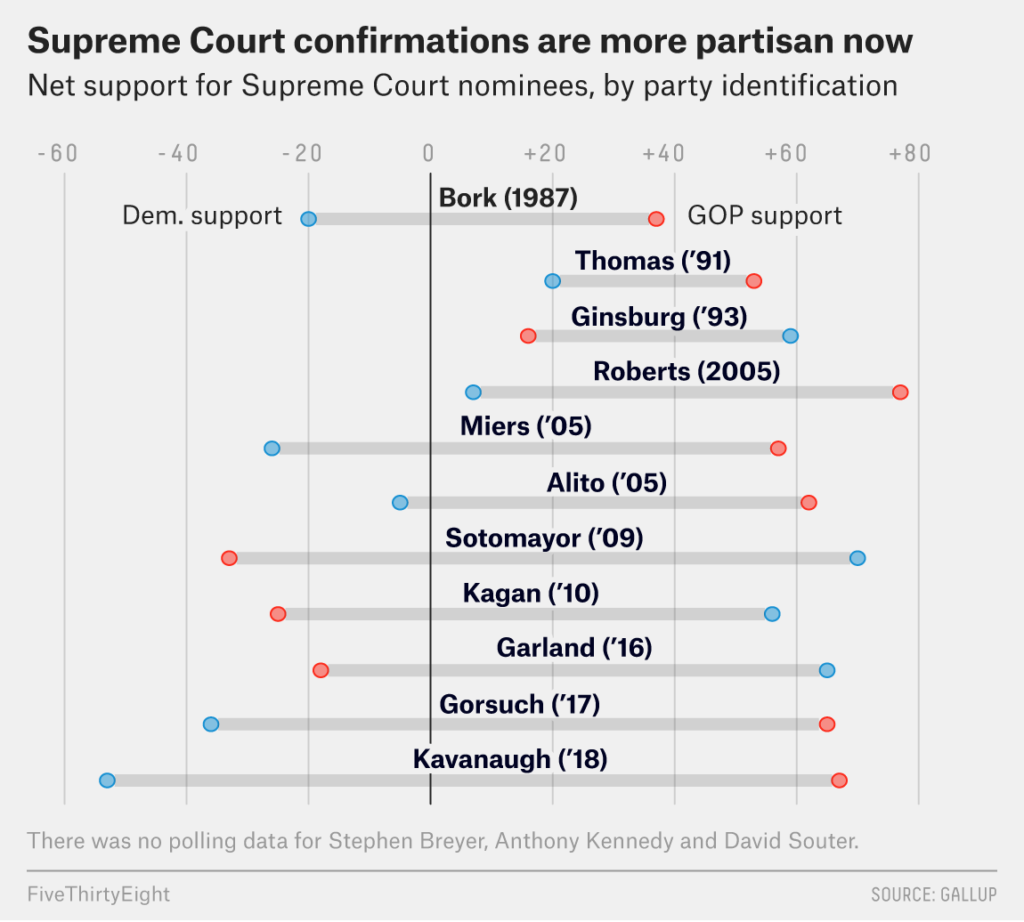
Regardless, it is my and many other Americans’ hope that when confirmed, Judge Barrett will faithfully abide by the original intent of the Constitution, refusing to forsake her duty as a judge to uphold the significance of our nation’s guiding legal document in modern day, as it was revered when first conceived. This article’s extensive list of examples of President Trump’s first two nominees to the Court, Neil Gorsuch and Brett Kavanaugh, maintaining their Originalist and Textualist conservative philosophies to apply fair-minded decisions to major cases involving abortion, criminal justice, border security, religious liberty, state sovereignty, etc., should provide ample inspiration to what Judge Barrett should aspire to emulate as a Justice. It is without a doubt that Kavanagh and Gorsuch have proven themselves worthy to be counted among the greats of the current Supreme Court, ruling consistently alongside longtime defenders of the Constitutional rule of law like Justice Clarence Thomas and Justice Samuel Alito, while not displaying signs of swing-vote betrayal like Chief Justice John Roberts has treacherously done (minus relatively few differences like the single LGBTQ ruling Gorsuch made). With this, I pray that Judge Amy Coney Barrett is swiftly approved to the Supreme Court and follows in the footsteps of President Trump’s first two Supreme Court Justices, Gorsuch and Kavanaugh, by continuing to restore the Originalist and Textualist, Natural Law and Natural Rights jurisprudence the original constitutional Framers intended to serve as the legal foundation of America’s Republic.
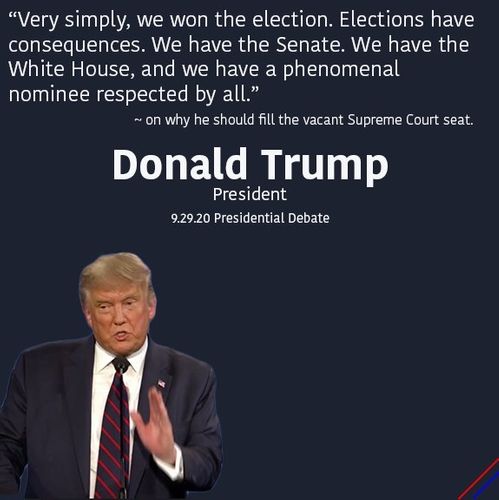
Category: Socrates Corner



